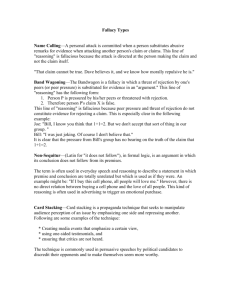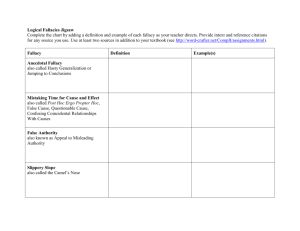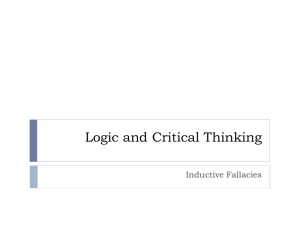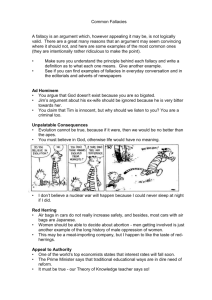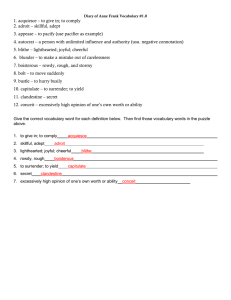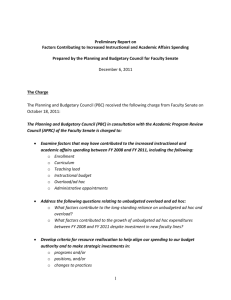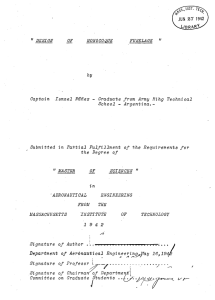Animal Farm AP Literary Terms Questions 1
advertisement
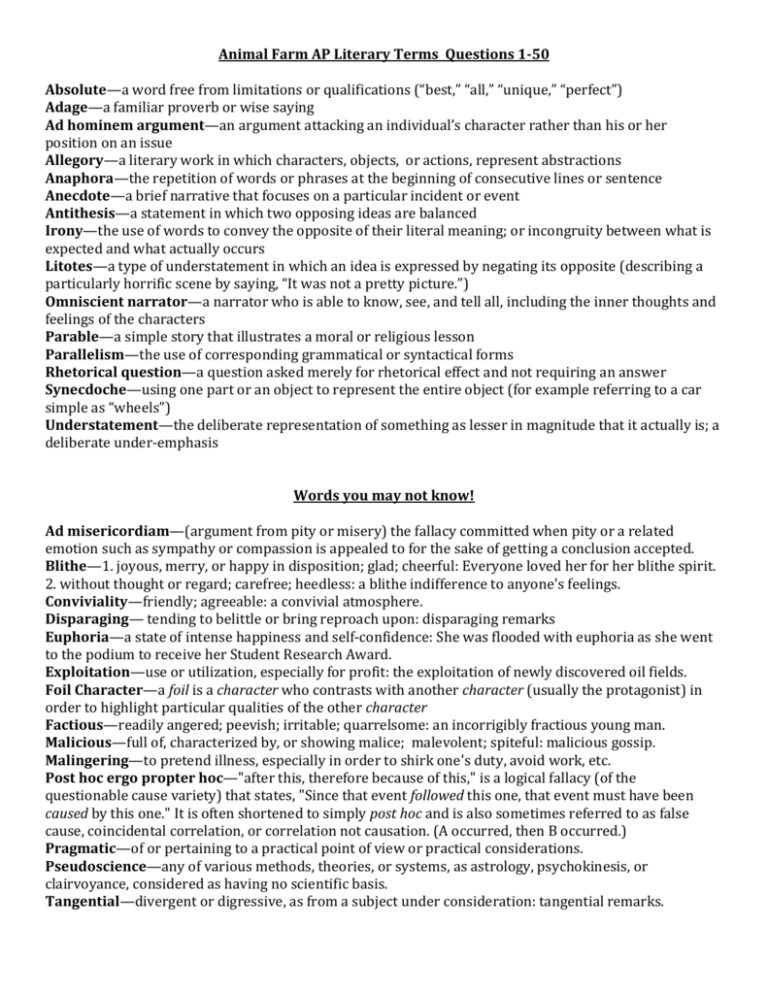
Animal Farm AP Literary Terms Questions 1-50 Absolute—a word free from limitations or qualifications (“best,” “all,” “unique,” “perfect”) Adage—a familiar proverb or wise saying Ad hominem argument—an argument attacking an individual’s character rather than his or her position on an issue Allegory—a literary work in which characters, objects, or actions, represent abstractions Anaphora—the repetition of words or phrases at the beginning of consecutive lines or sentence Anecdote—a brief narrative that focuses on a particular incident or event Antithesis—a statement in which two opposing ideas are balanced Irony—the use of words to convey the opposite of their literal meaning; or incongruity between what is expected and what actually occurs Litotes—a type of understatement in which an idea is expressed by negating its opposite (describing a particularly horrific scene by saying, “It was not a pretty picture.”) Omniscient narrator—a narrator who is able to know, see, and tell all, including the inner thoughts and feelings of the characters Parable—a simple story that illustrates a moral or religious lesson Parallelism—the use of corresponding grammatical or syntactical forms Rhetorical question—a question asked merely for rhetorical effect and not requiring an answer Synecdoche—using one part or an object to represent the entire object (for example referring to a car simple as “wheels”) Understatement—the deliberate representation of something as lesser in magnitude that it actually is; a deliberate under-emphasis Words you may not know! Ad misericordiam—(argument from pity or misery) the fallacy committed when pity or a related emotion such as sympathy or compassion is appealed to for the sake of getting a conclusion accepted. Blithe—1. joyous, merry, or happy in disposition; glad; cheerful: Everyone loved her for her blithe spirit. 2. without thought or regard; carefree; heedless: a blithe indifference to anyone's feelings. Conviviality—friendly; agreeable: a convivial atmosphere. Disparaging— tending to belittle or bring reproach upon: disparaging remarks Euphoria—a state of intense happiness and self-confidence: She was flooded with euphoria as she went to the podium to receive her Student Research Award. Exploitation—use or utilization, especially for profit: the exploitation of newly discovered oil fields. Foil Character—a foil is a character who contrasts with another character (usually the protagonist) in order to highlight particular qualities of the other character Factious—readily angered; peevish; irritable; quarrelsome: an incorrigibly fractious young man. Malicious—full of, characterized by, or showing malice; malevolent; spiteful: malicious gossip. Malingering—to pretend illness, especially in order to shirk one's duty, avoid work, etc. Post hoc ergo propter hoc—"after this, therefore because of this," is a logical fallacy (of the questionable cause variety) that states, "Since that event followed this one, that event must have been caused by this one." It is often shortened to simply post hoc and is also sometimes referred to as false cause, coincidental correlation, or correlation not causation. (A occurred, then B occurred.) Pragmatic—of or pertaining to a practical point of view or practical considerations. Pseudoscience—any of various methods, theories, or systems, as astrology, psychokinesis, or clairvoyance, considered as having no scientific basis. Tangential—divergent or digressive, as from a subject under consideration: tangential remarks.
